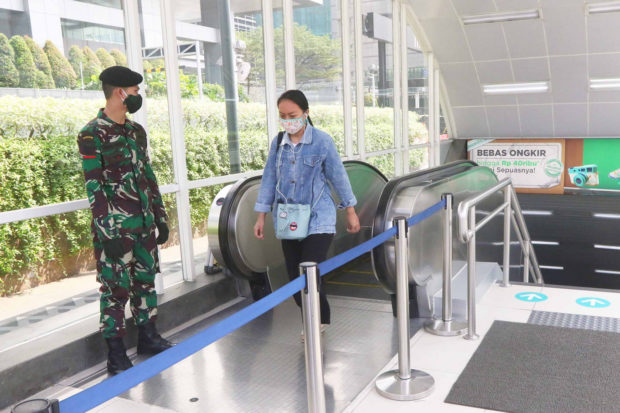Indonesian military deployed for coronavirus fight

Have a safe trip: A soldier stands guard at Bundaran HI MRT station in Central Jakarta on Friday. The government has deployed Indonesian Military (TNI) and National Police personnel to monitor the implementation of health protocols at 1,800 public facilities in four provinces and 25 regencies and cities. The Jakarta Post/Asia News Network/Dhoni Setiawan
JAKARTA — The government has increased the deployment of police and military personnel to improve compliance with health protocols as the nation struggles to control the rising number of COVID-19 cases and deaths.
Coordinating Maritime Affairs and Investment Minister Luhut Pandjaitan said the Indonesian Military and the National Police were joining forces to “get people to wear masks and maintain their distance”, saying that higher compliance with health protocols would curb virus transmission.
Luhut is among the officials tasked by President Joko “Jokowi” Widodo with bringing down infections in nine of the country’s hardest-hit provinces. The President announced the plan after Jakarta Governor Anies Baswedan reimposed large-scale social restrictions (PSBB) in the capital city on Sept. 14.
Other officials include Health Minister Terawan Agus Putranto and National Disaster Mitigation Agency (BNPB) head Doni Monardo, who, like Luhut, are all active or retired military personnel.
“Each military command is tasked with [providing] guidance to neighborhood units using assertive messages and health protocols,” Luhut said during a teleconference on Friday.
Article continues after this advertisementThe military’s expanded role in the government’s COVID-19 response began in August when the President issued Presidential Instruction (Inpres) No. 6/2020, ordering the military to provide support to local leaders by monitoring public compliance with health protocols along with the police.
Article continues after this advertisementJokowi also appointed Army chief of staff Gen. Andika Perkasa and National Police deputy chief Comr. Gen. Gatot Eddy Pramono the deputy heads of the COVID-19 handling and national economic recovery committee.
The joint team conducted raids between Sept. 14 and 17 and dealt with over 450,000 cases of health violations in 30,000 locations.
Gatot said in the same teleconference that around 50,000 police personnel were deployed in the operation, which issued verbal warnings to over 379,000 violators, written warnings to over 56,000 violators and fines totaling Rp 399 million to over 16,000 violators. The team has shuttered 63 businesses that have failed to comply with health protocols.
“We are also mobile […] through teams that hunt down violators. The targets are places where there are crowds, food spots and places where regional regulations are enforced,” he said.
While many experts deem the police and military’s involvement as necessary to a degree, they also believe that the government has yet to deal with the root cause of the public’s low compliance with health protocols, which is ineffective public communication.
“Misinformation about COVID-19 spreads more rapidly than the right information on COVID-19,” Masdalina Pane of the Indonesian Epidemiologists Association (PAEI) said.
Airlangga University epidemiology lecturer Laura Navika Yamani said that synchronizing policies and the enforcement of protocols remained unfinished business for the government. She warned about the risk of crowds becoming infection clusters during the upcoming regional elections.
“Personnel in the field should also have the same understanding of the policies [and the nature of virus transmission], instead of just acting as enforcers. Recent cases of people being punished for not wearing masks properly while in their car alone is an extreme example of this,” Laura said, adding that monitoring should be prioritized in crowded places, especially those indoors.
Civil society organizations grouped under the Civil Society Coalition have criticized the military’s involvement in the enforcement of health protocols, saying the military were acting beyond “their role and expertise”. They also urged the government to allow experts to take the lead on health measures and emphasized the use of persuasion in spreading awareness on health protocols.
“We demand that the military chief return the military to their role as the country’s defense institution by not meddling with non-defense affairs such as the pandemic response, except with limitations in sectors as regulated in Article 7 of the [2004] Indonesian Military Law,” the coalition said in a statement.
However, Andika said that the military, since it first started “disciplining” in March, made an effort to respect boundaries.
“We’re trying to help as much as we can, without taking a frontline position because this falls under the auspices of our fellow police officers,” he said.
The police and the military will continue with their respective roles when the country rolls out its mass vaccination in December, according to Luhut.
He did not disclose which vaccine he was referring to, as the Sinovac vaccine candidate is still in its trial phase, with interim analysis of the results expected in early 2021.
For more news about the novel coronavirus click here.
What you need to know about Coronavirus.
For more information on COVID-19, call the DOH Hotline: (02) 86517800 local 1149/1150.
The Inquirer Foundation supports our healthcare frontliners and is still accepting cash donations to be deposited at Banco de Oro (BDO) current account #007960018860 or donate through PayMaya using this link.